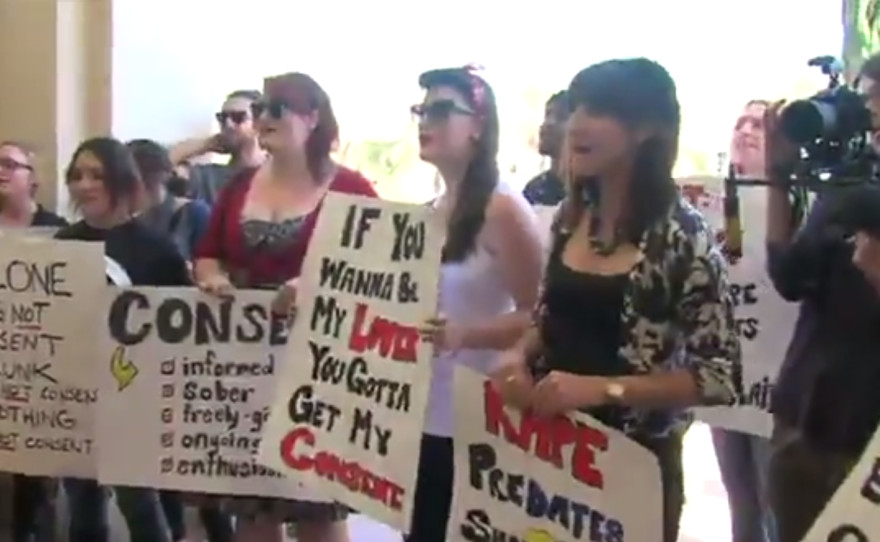
Roughly 20 student activists led a march and sit-in Tuesday on the San Diego State University campus to demand action against fraternities for perpetuating what the activists call a rape culture.
The protesters carried signs that read, "Consent is Hot, Assault is Illegal." They chanted, "No means no, yes means yes, no matter where we are or how we dress."
The protest was in response to events that occurred on Nov. 21 during an anti-rape march called Take Back the Night. Student marchers said members of two fraternities, Delta Sigma Phi and Sigma Phi Epsilon, sexually harassed them. The participants said that as they marched past fraternity houses members yelled obscenities and waved sex toys.
Tuesday's march led to a sit-in at Manchester Hall where the activists, many of them sexual assault survivors, asked to meet with SDSU President Elliot Hirshman. He was at a meeting off campus and was unable to meet with the protesters, an SDSU spokesman said.
The activists' demands included an open forum with Hirshman during the spring semester and the resignation of Associated Students President J. Cole and all members of the Sigma Phi Epsilon and Delta Sigma Phi fraternities who sit on the board of Associated Students. The protesters also want the president of the Intrafraternity Council to resign.
Another of the demands is to have a planned Women's Resource Center serve as a rape crisis center.
READ MORE:
SDSU Beefs Up Sexual Assault Policies; Critics Ask Why It Took So Long
Fraternity Culture Linked To College Sexual Assault Problem
Justice Elusive In SDSU Sexual Assault Case
The sit-in turned into a dialogue between protesters and SDSU's Title IX coordinator, Jessica Rentto, who talked with the students. As the school's Title IX coordinator, Rentto oversees sexual assault complaints reported to the university.
Some student activists expressed frustration with the university's response to what happened at the Take Back the Night March, including student Marina Butler.
"I was terrified that night and SDSU did nothing," said Butler. "The SDSU police weren’t there. The administration wasn’t there. Nobody’s asked me what’s happened and nobody’s reached out to us."
Randall Timm, SDSU's director of Life and Leadership, is leading the investigation into what happened at the anti-rape march. He said he's still conducting interviews and getting new information about what occurred. He will compile a report and make recommendations. Timm said the process was slightly delayed by the Thanksgiving break. The fraternity chapters could face penalties, as could individual members of the fraternities.
On Nov. 25, the Intrafraternity Council announced a voluntary, indefinite suspension of all social activities. Timm said that includes parties at fraternity houses. The council also pledged to have every member of the Greek community undergo sexual violence and bystander training. Timm said the hope is that Greek members will complete a 45-minute online training by early January.
During the sit-in, Rentto said it was important to keep the fraternities engaged in the process to help change the culture in the Greek system. She also said the problem of campus sexual assaults is much bigger than the fraternities.
"Yes, we need to focus attention on the fraternities, but we also need to focus attention on the entire school community," Rentto said. "There was a comment from the president of Vassar, who said they don’t have fraternities and they don’t have athletics, but they still have rape."
According to a spokesman for campus police, 17 campus-related sexual assaults have been reported at SDSU in 2014, including 13 since the start of the fall semester. An arrest was made Tuesday in one of those cases.
Seven of the reported assaults this year occurred at fraternities, police said.






